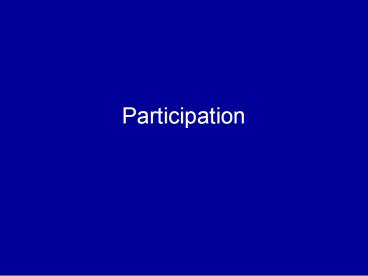Participation - PowerPoint PPT Presentation
1 / 32
Title:
Participation
Description:
Tried to persuade someone to vote for a party or candidate. 4 ... An IPOD Touch. Voter Turnout, 2004 Election. What makes a person more likely to vote? ... – PowerPoint PPT presentation
Number of Views:66
Avg rating:3.0/5.0
Title: Participation
1
Participation
2
What are all of the ways you can participate in
politics?
3
Participation, PS 125
4
Why is participation important?
5
Why dont some people participate?
6
Probability of voting Benefit - Cost
7
Rational calculations?(Would you give up the
right to vote forever for?)
8
Voter Turnout, 2004 Election
9
What makes a person more likely to vote?
- Higher Education
- Why?
- More interest in politics (higher benefit)
- More background information to understand
politics, and skills to get through the
registration and voting process (lower costs)
10
Level of information, PS 125
11
Effect of education on turnout
12
What makes a person more likely to vote?
- Higher Education
- Higher Income
- Why?
- Free time (lower costs)
- Stake in community (taxes etc.higher benefit)
13
Effect of income on turnout
14
Effect of race on turnout?
15
What makes a person more likely to vote?
- Higher Education
- Higher Income / more resources
- Lack of language/cultural barriers
16
Effect of citizenship on turnout
17
What makes a person more likely to vote?
- Higher Education
- Higher Income / more resources
- Lack of language/cultural barriers
- Easy registration
18
Effect of Registration laws on turnout
19
So why dont young people vote?
20
Newspaper readership
21
Newspaper readership, by age
22
What makes a person more likely to vote?
- Higher Education
- Higher Income / more resources
- Lack of language/cultural barriers
- Easy registration
- Interest
- Social Connectedness
23
What makes a person more likely to vote?
- Social connectedness
- Why?
- Learn civic skills in a group (lower costs)
- Feel responsibility to a particular community
(higher benefit) - Group norms (higher social benefit)
24
Effect of marriage on turnout
25
Effect of residency on turnout
26
Effect of home ownership on turnout
27
What is social capital?
- The norms and trust that develop from
interpersonal social relationships - A byproduct of other activities, not something
created on its own
28
Putnams evidence for declining social capital
- Membership in PTA, League of Women Voters, Elks
Clubs and the like have declined 25-50 in the
last 25 years. - Bowling leagues and sports leagues have less
participation - People spend up to 25 less time socializing with
friends than they did in 1965. - Church attendance is down 15-30.
- Attending Club Meetings down 58
- Family dinners down 33
- Having friends over down 45
29
Why the decline of social capital?
30
(No Transcript)
31
What are ways we can build social capital?
32
What does a healthy democracy really need?
- Which do you think has a bigger potential affect
on the health of democracy, having an informed
citizenry, or having close-knit communities? - Do you think the system will be biased against
people who dont participate? - So who might the system be biased against?
- Does that make for a healthy democracy?































